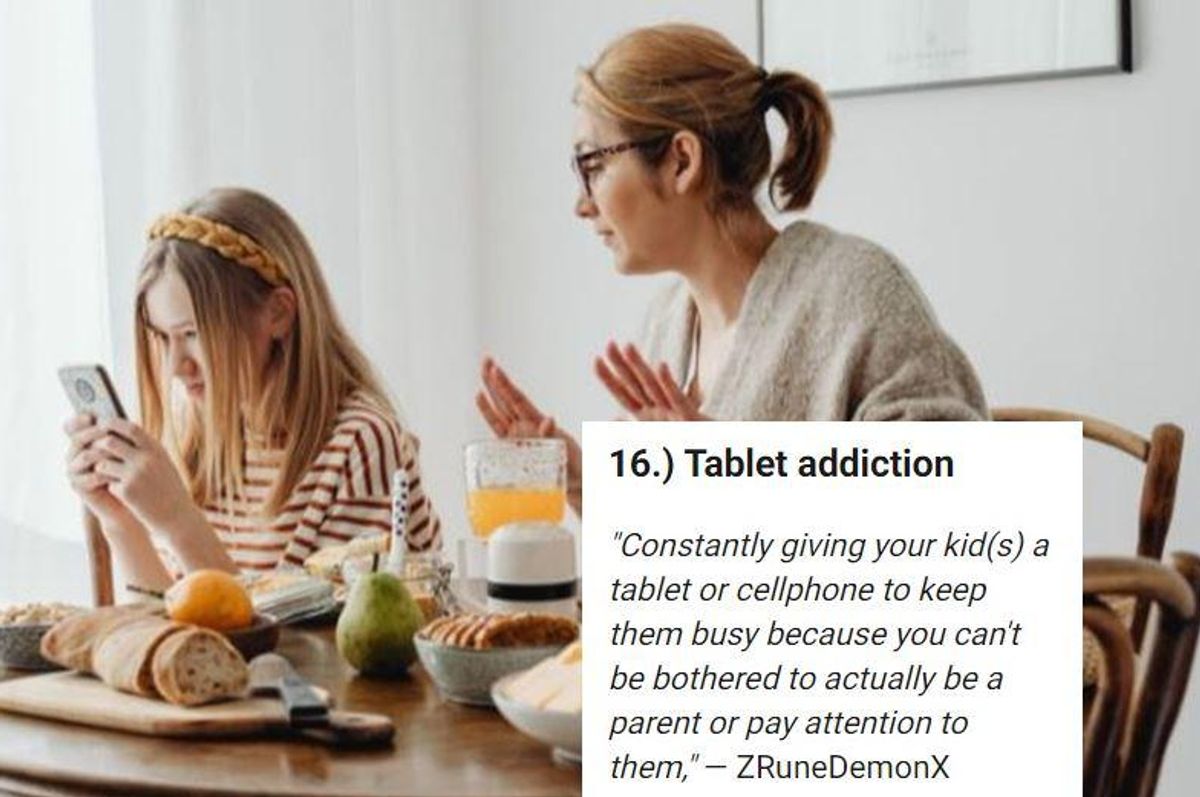People are sharing the parenting trends that absolutely ‘need to end now’
Here are 21 of the best responses.

Not all trends in parenting are a good thing.
It’s tough to quantify whether today’s parents are stricter or more permissive than previous generations, but the overall sentiment seems to be that parents are more lenient than they were a few decades back.
A 2015 poll by YouGov found that younger Americans are more likely than their elders to have been raised by “not very strict” or “not at all strict” parents. Thirty-nine percent of under-30s say that their parents weren't very strict or not strict at all, compared to only 15% of over-65s.
Nicola Kraus, author of The Nanny Diaries, believes that it’s a natural outgrowth of the fact that we know a lot more about children than we did in the past.
“We are deeply aware that our children are cognizant, conscious humans in a way previous generations weren't aware. Children were treated like pets or, worse, release valves for their parents' stresses and fears, then expected to magically transform into healthy, functional adults,” she writes.
But this change in parenting has encouraged other trends that many think are creating a greater number of entitled young adults who can’t fend for themselves. These days we have helicopter parents, bulldozer parents, and dependent parents whose overinvolvement in their children’s lives renders them incapable of becoming fully integrated adults.
Reddit user u/qquackie asked the online forum,"What parenting 'trend' do you strongly disagree with?" and got an overwhelming number of responses from people who think that today's parents are raising entitled children. Many of the responders think that parents are being too sensitive with their children and they don’t provide firm boundaries. They also think it’s a big problem for kids to think they’re the center of the universe.
Here are 21 of the most popular responses to the parenting question.
1. Pretending that not parenting is parenting
"I won't tell my child to stop kicking your leg repeatedly because i don't want to crush his spirit!' — StoicDonkey
2. Denying your kid any negative experiences or emotions
"They are a normal part of being a person, teach them to handle negative emotions now before you send them out into a world they are not prepared to handle." — IAmRules
3. Fake “gentle parenting”
"You hear and see so many parents letting their children do whatever they want, no matter how destructive, rude or hurtful their behaviours are. Parents find themselves beholden to the whims of their childrens’ emotions in the name of gentle parenting, instead of true gentle parenting where (so I hear) boundaries are set alongside validating emotions." — candianuk
4. Not setting clear boundaries
"You are the adult, not the kid. Children benefit sooo much more from clear rules and consequences." — NorthWeight3580
5. The “bulldozer” parent
"The parent who removes all obstacles/challenges from a child’s life so they don’t learn about perseverance, problem solving, failure (sometimes you can try hard and still not get the reward) and learning from mistakes - unless the goal is to develop a highly anxious person - then, being a bulldozer parent is great." — spinefexmouse
6. Stage-mom syndrome
"Abusing the talents of your child just to boost your self image in society." — sweettooth_92
7. Nonstop supervision
"Hovering over them at every turn. Whatever happened to tossing them in a play area in another room and letting them create, explore, and get the occasional bumps?" — ansibley
8. Not believing the teacher
"'My kid never lies to me.' Seriously. Parents absolutely should be their kid’s biggest supporter. But support sometimes means holding the kid responsible when they don’t do the right thing." — jdith123
9. "No talking back!"
"If this also counts... Parents who punish their kids for speaking up or otherwise explaining something, saying that they're 'talking back.' I honestly don't get why most parents refuse to admit they're not always right sometimes. Besides, what if their kid one day comes up to them and says another adult is touching them inappropriately?" — EntryRepresentative5
10. Helicopter parenting
"Kids need freedom to explore the world, get dirty, engage in free play. I am not advocating putting the child outside on a Saturday morning and telling them to come home when the street lights come on, but an age acceptable level of freedom." — Cat_Astrophe_X
11. Pushing them too hard
"Pushing them too hard in sports, academics, etc. Like pushing til they need therapy or get injured, no free time, no downtime. FFS, they only get to be young & without excessive responsibilities once." — Oh-Oh-Ophelia
12. Tablets in public
"Loud cartoons and games on tablets in public places." — StarrCreationsLLC
13. Potty training too late
"Oh man, I’m a nanny and work in daycare. I can talk so much about this. One is late potty training. Waiting to potty train a child is more and more common. Which I generally agree with. Wait until they’re 2.5-3 and knock it out. Some take longer, some are probably ready earlier. Better than rushing it and causing issues. What this has turned into. Not potty training. I nanny a 4 year old that is still in pull ups. She is more than capable of using the potty. Our 4 year old classroom just installed a diaper genie because so many 4 year olds are starting preschool in diapers. My best friend who is a Kindergarten teacher had 2 kids start kindergarten in diapers. Luckily they’re potty trained now." — cleaning-meaning
14. Kids on social media
"Creating social media channels for your children where they proceed to upload videos and photos of their kids. Perfect place for pedophiles." — AJSK18
15. Too much structure
"I guess the overall trend of prioritizing academics/extracurriculars and college admissions over everything else. Give your kids some chores and let them hang out with their friends outside of structured sports and musical activities!" — hausfrau224
16. Tablet addiction
"Constantly giving your kid(s) a tablet or cellphone to keep them busy because you can't be bothered to actually be a parent or pay attention to them." — ZRuneDemonX
17. Letting the kid make all the choices
"I believe kids should have reasonable choices, like what their snack is and the character that's on their bedspread, but you can't let your 3 year old decide when you're allowed to leave your house. The world doesn't work that way." — cihojuda
18. Silence
"Saying 'what goes on in this house, stays in this house.' I know hundreds of victims of abuse, go through years of pain because of this phrase." — Dixie_Maclant
19. Birthdays
"The social media trend that keeps upping the expectations for birthday parties and any celebration connected to a kid. When I was a kid, birthdays consisted of a handmade invitation made by me, a cake from the grocery store, food that my Mom cooked and then inviting some friends and family over for games. Today's expectation is that every monthversary and half-birthday consist of a huge arch of balloons that will end up in the trash, a customized three-tier fondant cake, gift wrapping that color-coordinates with the themed party favors and of course, a very intentional outfit for the numerous photo ops that will take up most of the day. Anything for the 'gram, right? Don't even get me started on gender reveal announcements." — littlebunsenburner
20. Parent, not friend
"Trying to be your kid's 'friend,' not a parent. A parent is there to provide guidance and responsible behavior to model. Yes, sometimes making their actions have consequences and setting boundaries can be difficult and they'll not be too happy with you. That's part of the job. Ultimately I think that will result in a healthier relationship than being the "cool" permissive parent. I've seen results of that style of (not) parenting with very sad outcomes." — DataPlenty
21. You're not special
"Perpetuating the myth that one's children are somehow special. With about 97% certainty, they are not. Teaching them that they are just sets them up for crushing disappointment down the road. It's far better to raise kids to believe they are ordinary people with a few gifts, but also some flaws and weaknesses." — AssistantToTheSensei
This article originally appeared two years ago.
- Wales just made spanking illegal, joining more than 60 countries that have outlawed corporal punishment ›
- New study shows spanking hurts kids' mental health and is less effective at teaching lessons ›
- Child development Phd shares parenting advice - Upworthy ›
- None ›
- People debunk social media negativity - Upworthy ›
- The decline of cousins in the U.S. - Upworthy ›
- 10 things kids get in trouble for that adults get away with - Upworthy ›
- Sabrina Benaim's 'Explaining Depression to My Mother' poem - Upworthy ›
- Mom has different take on parents being on their phones - Upworthy ›
- People share the parenting reality that surprised them most - Upworthy ›
- Mother of two CEO daughters shares unpopular parenting rule - Upworthy ›
- 8 trends in 2025 people say need to end immediately - Upworthy ›
- Studies show non-parents are happier than parents unless 1 of these 3 things are true - Upworthy ›
- ‘Cozymaxxing’: The real science behind everyone’s new favorite stress antidote - Upworthy ›
- 15 parenting trends that people say should end immediately - Upworthy ›
- Studies show non-parents are happier than parents unless 1 of these 3 things are true - Upworthy ›



 Each of those arms has its own brain?
Each of those arms has its own brain?
 Homemade granola bars with chocolate chips – perfect for a delicious snack!
Homemade granola bars with chocolate chips – perfect for a delicious snack! Refresh with a healthy green juice boost.
Refresh with a healthy green juice boost. Making fresh orange juice in the kitchen. 🍊
Making fresh orange juice in the kitchen. 🍊 Be careful with supplements.
Be careful with supplements.
 A
A 
 A white porcelain doll with a tear stain. Photo by
A white porcelain doll with a tear stain. Photo by 